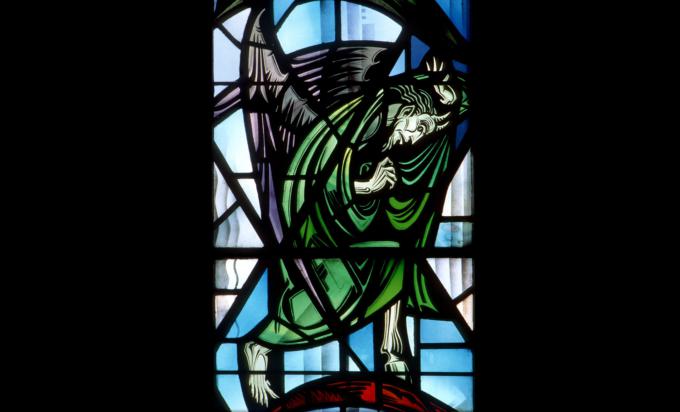
Faith
Our Catholic belief in the existence of literal demons is made very clear in our liturgy and other prayers.

Cooper
Q: Is the devil an actual being, or is he a metaphor for "people doing bad," and for just general evil in the world? I've sometimes heard this last called "the demonic," which I understood to mean just a sort of negative spirit that people put out, or create, by being mean to each other. (Indiana)
A: While there might be contexts in which we might speak of the devil or the demonic in a purely metaphorical or rhetorical sense -- such as when we describe some evil but obviously human action as "demonic" or "diabolical" -- we as Catholics do believe that the devil or Satan is a real, personal being.
Paragraph 414 of the catechism speaks of the devil in literal terms when it tells us that: "Satan or the devil and the other demons are fallen angels who have freely refused to serve God and his plan." There are also several places in the Gospels where the devil and demons are described as playing an actual, historical role in the earthly life of Jesus, such as when Satan tempted Jesus in the desert (see Mt 4:1-11 and Lk 4:1-13), or when Jesus cast out demons who called out to him by name (e.g., Lk 4:34).
There is a Catholic Latin maxim that goes: "lex orandi, lex credendi," which can be roughly translated as: "what we pray is what we believe." Our Catholic belief in the existence of literal demons is made very clear in our liturgy and other prayers. The most obvious example is the ritual of major exorcism, which a properly mandated priest-exorcist uses to free those who are really possessed by actual demons. But there are also several "minor exorcisms" used in the sacraments of initiation, where the church prays for the spiritual protection of those soon to be baptized.
Q: Where exactly in the Catechism of the Catholic Church does it say we can receive Communion by intinction? Our parish has started doing this recently, and people love it! But other parishes' priests say this is not "legal" according to church doctrine. I have looked in the catechism and cannot find exactly where it says it is OK. Can you help me?
A: The practice of administering Holy Communion by intinction -- i.e., where the minister dips the host in the precious blood, which the communicant then receives on the tongue -- is certainly "legal" and is an established option for receiving communion under both kinds.
This is not referenced in the Catechism of the Catholic Church, as the catechism is meant to teach us about the theological aspects of the truths of our faith, as opposed to spelling out the very practical nuts-and-bolts of Catholic life. For more concrete directives, we need to turn to other sources.
One such source is the General Instruction of the Roman Missal (GIRM), which is essentially the worldwide "instruction book" for how Mass is to be celebrated. Paragraph 287 of the GIRM tells us how Communion via intinction should be handled: "If Communion from the chalice is carried out by intinction, each communicant, holding a Communion-plate under the mouth, approaches the Priest who holds a vessel with the sacred particles, with a minister standing at his side and holding the chalice. The Priest takes a host, intincts it partly in the chalice and, showing it, says, The Body and Blood of Christ. The communicant replies, Amen, receives the Sacrament in the mouth from the Priest, and then withdraws."
In the United States specifically, the U.S. Conference of Catholic Bishops issued a national policy document in 2002 titled: "Norms for the Distribution and Reception of Holy Communion under Both Kinds in the Dioceses of the United States of America." Paragraph 49 of this document essentially re-states the above-mentioned paragraph 287 of the GIRM.
Clearly, the church is not going to give us specific liturgical directives for something that is illicit or otherwise not allowed.
- Canonist Jenna Marie Cooper is a consecrated virgin, a practicing canon lawyer, and columnist for OSV News.
Recent articles in the Faith & Family section
-
Did you know?Father Robert M. O'Grady
-
Sowing the Seeds of FaithMaureen Crowley Heil
-
Bread left overScott Hahn
-
Scripture Reflection for July 28, 2024, Seventeenth Sunday in Ordinary TimeJem Sullivan
-
What the universal call to holiness entailsDr. R. Jared Staudt


















